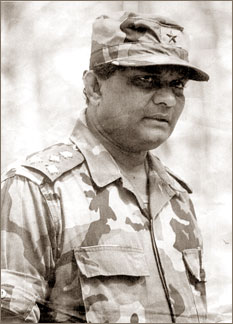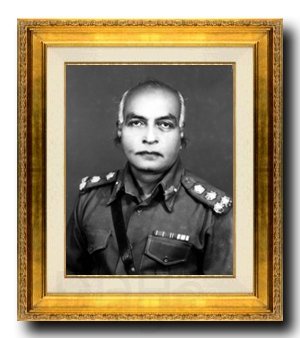
Rajiv Gandhi was an Indian politician who was the prime minister of India from 1984 to 1989. He took office after the assassination of his mother, then–prime minister Indira Gandhi, to become at the age of 40 the youngest Indian prime minister. He served until his defeat at the 1989 election, and then became Leader of the Opposition, Lok Sabha, resigning in December 1990, six months before his own assassination.

Sri Lankabhimanya Ranasinghe Premadasa was the third President of Sri Lanka from 2 January 1989 until his assassination in 1993. He also served as Prime Minister of Sri Lanka from 6 February 1978 to 2 January 1989. This makes Premadasa the longest-serving uninterrupted Prime Minister of Sri Lanka, having served in the post for nearly 11 years. He was the first person to be conferred with Sri Lanka's highest civilian award, the Sri Lankabhimanya in 1986 by President J. R. Jayewardene.

Lieutenant General Denzil Lakshman Kobbekaduwa, RWP, RSP, VSV, USP was a senior Sri Lankan Army officer who served in the 1971 Insurrection and the Sri Lankan Civil War.

Major General Vanigamuni Indrajith Vijeyakumar Mendis Wimalaratne, RWP, RSP, VSV, USP was a senior Sri Lanka Army officer. One of the most distinguished field commanders in Sri Lanka, Wimalaratne raised the Gajaba Regiment. He commanded the 1st Brigade during the Vadamarachchi Operation, the Amphibious Task Force Commander during Operation Balavegaya, and was the Commander Security Forces – Jaffna at the time of his death in a landmine explosion at Point Arali in the Kayts Island while making preparations to re-capture Jaffna.
The Indo-Sri Lanka Peace Accord was an accord signed in Colombo on 29 July 1987, between Indian Prime Minister Rajiv Gandhi and Sri Lankan President J. R. Jayewardene. The accord was expected to resolve the Sri Lankan Civil War by enabling the thirteenth Amendment to the Constitution of Sri Lanka and the Provincial Councils Act of 1987. Under the terms of the agreement, Colombo agreed to a devolution of power to the provinces, the Sri Lankan troops were to be withdrawn to their barracks in the north and the Tamil rebels were to surrender their arms.

Indian Peace Keeping Force (IPKF) was the Indian military contingent performing a peacekeeping operation in Sri Lanka between 1987 and 1990. It was formed under the mandate of the 1987 Indo-Sri Lankan Accord that aimed to end the Sri Lankan Civil War between Sri Lankan Tamil militant groups such as the Liberation Tigers of Tamil Eelam (LTTE) and the Sri Lankan military.

Operation Poomalai, also known as Eagle Mission 4, was the codename assigned to a mission undertaken by the Indian Air Force for airdropping supplies over the besieged city of Jaffna in Sri Lanka on 4 June 1987 to support the Tamil Tigers during the Sri Lankan Civil War.
Operation Pawan was the code name assigned to the operation by the Indian Peace Keeping Force (IPKF) to take control of Jaffna from the Liberation Tigers of Tamil Eelam (LTTE), better known as the Tamil Tigers, in late 1987 to enforce the disarmament of the LTTE as a part of the Indo-Sri Lanka Accord. In brutal fighting lasting about three weeks, the IPKF took control of the Jaffna Peninsula from the LTTE, something that the Sri Lankan Army had tried but failed to do. Supported by Indian Army tanks, helicopter gunships and heavy artillery, the IPKF routed the LTTE at the cost of 214 soldiers and officers.
Operation Liberation also known as the Vadamarachchi Operation was the military offensive carried out by the Sri Lankan Armed Forces in May and June 1987 to recapture the territory of Vadamarachchi in the Jaffna peninsula from the LTTE. At the time it was the largest combined services operation undertaken by the armed forces deploying multiple brigade-size formation, becoming the first conventional warfare engagement on Sri Lankan soil after the end of British colonial rule. The operation involved nearly 4,000 troops, supported by ground-attack aircraft, helicopter gunships and naval gun boats. The offensive achieved its primary objective, however operations were suspended when the Indian government dropped food supplies over Jaffna in Operation Poomalai on June 4, 1987, which prompted the Sri Lankan government to accept the Indo-Sri Lankan Accord.

India–Sri Lanka relations, Indian-Sri Lankan relations, or Indo-Sri Lanka relations, are the bilateral relations between India and Sri Lanka. India has emerged as the foremost partner for Sri Lanka in the endeavor to revitalize its economy, reform its bureaucracy, and enhance decision-making processes for future economic collaborations. India and Sri Lanka share a maritime border. India is the only neighbour of Sri Lanka, separated by the Palk Strait; both states occupy a strategic position in South Asia and have sought to build a common security umbrella in the Indian Ocean. Both India and Sri Lanka are republics that are members of the Commonwealth of Nations.
Events in the year 1987 in the Republic of India.

The 1987 grenade attack in the Sri Lankan Parliament is an attack that took place on August 18, 1987, when an assailant hurled two grenades into a room where the Sri Lankan president, prime minister and Member of Parliament members of parliament were meeting. The grenades bounced off the table at which president J. R. Jayawardene and prime minister Ranasinghe Premadasa were sitting, and rolled away. A member of parliament and a ministry secretary were killed by the explosions.
The Indian intervention in the Sri Lankan civil war was the deployment of the Indian Peace Keeping Force in Sri Lanka intended to perform a peacekeeping role. The deployment followed the Indo-Sri Lankan Accord between India and Sri Lanka of 1987 which was intended to end the Sri Lankan civil war between separatist Sri Lankan Tamil nationalists, principally the Liberation Tigers of Tamil Eelam (LTTE), and the Sri Lankan Military.

Brigadier Donald Danister Hewagama (1926-2009) was a Sri Lankan lawyer. He was the Judge Advocate General to the three Armed Forces of Sri Lanka.

General S. Cyril Ranatunga, VSV was a Sri Lanka Army officer. He served as Secretary of Defence, General Officer Commanding, Joint Operations Command and Chief of Staff of the Sri Lanka Army during the 1980s. He was also the Sri Lankan High Commissioner to Australia and later to the United Kingdom.
Vice Admiral Hikkaduwage Ananda Silva, VSV was a Sri Lankan senior naval officer who was the 11th Commander of the Sri Lankan Navy.
The following lists events that happened during 1987 in Sri Lanka.

Vijaya Kumaratunga, Sri Lankan politician and founder of the Sri Lanka Mahajana Pakshaya, was assassinated by an assassin of the militant organization Deshapremi Janatha Viyaparaya (DJV) on February 16, 1988, while attempting to leave his home in Polhengoda in Colombo.
The Battle of Nelliady took place during the early stages of the Sri Lankan Civil War. It occurred on 5 July 1987, when a force of 50 LTTE militants assaulted the Sri Lanka Army Camp located in the Nelliady Central College in the town of Nelliady in the Jaffna District in northern Sri Lanka. The attack was the bloodiest battle for the Sri Lankan forces since the Vadamarachchi Operation in June 1987, which cleared the area of Nelliady of LTTE militants. The attack on Nelliady army camp resulted in the Sri Lankan forces suffering 19 killed and 31 wounded, while LTTE executed its first suicide bombing which was carried out by Captain Miller.









